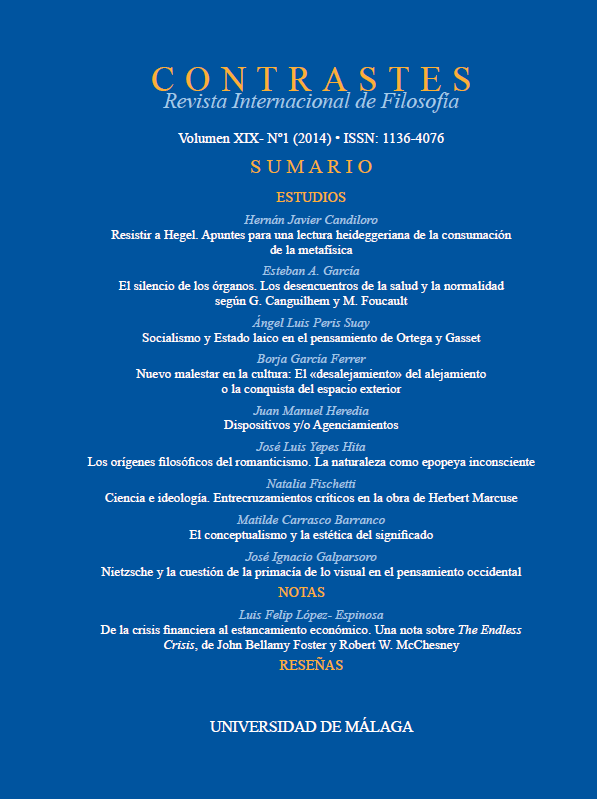Philosophical origins of Romanticism. Nature as an unconscious epopee
DOI:
https://doi.org/10.24310/Contrastescontrastes.v19i1.1081Keywords:
Romanticism; Enlightenment; Pedagogy; Naturphilosophie; Natural History; Erziehungsroman; Bildungsroman; Hamann; Herder; Kant; Fichte; Goethe; Schiller; Schelling; Novalis; Hegel; HölderlinAbstract
The history of ideas and culture considers Romanticism a literary and aesthetic movement. However, it arises as the answer to an essential question for Philosophy, showing a highly rebellious attitude against both the established political manners and the education received from the previous generation. Bringing out Romanticism and academic formalism was the way to deactivate their strength. The search for a heroic age determined a conception of time and its civilizing process which was opposed to the enlightened aspiration of progress. The first precedent is Hamann, with a critical theology that was fostered by pietism which, at the same time, embraced the idea of empiricism coined by Hume. For Herder, Nature becomes means and aim of the new education, recovering somehow the original meaning of radicalism in Rousseau. For Kant, that was a loud fashion. However, he learnt from them the aporias of an organicist finality of Nature and the inability to explain this process from the physical determinism of Laplace, which was still used in experimental sciences. Opposed to the externalist casuistry, freedom becomes the essence of human nature. Romantics were fascinated by this idea. For Schiller, it is the driving force of human history, which is above natural history – the Spirit, according to Hegel –. This was the context of the philosophe Fichte taught, idealism:the duty of action is prior to the moral duty itself. And this is the philosophy of the so called «training years» of Schelling, the Naturphilosophen and Hegel himself. The will of acting in the philosophy of Fichte is an unconscious force for Novalis and Hölderlin. They consider the sublime process of Nature a transposition of their own youth, of the contradiction and evolution of their own psyche: the breeding that goes over years and adds new stages. This is why Hegel points out, in his semester 1805/06, Realphilosophie: «Does Earth have a history? What is history?».
Downloads
Metrics
Publication Facts
Reviewer profiles N/A
Author statements
Indexed in
-
—
- Academic society
- N/A
- Publisher
- Universidad de Málaga
Downloads
Published
How to Cite
Issue
Section
License
This journal provides immediate free access to its content under the principle of making research freely available to the public. All content published in Contrastes. Revista Internacional de Filosofía, are subject to the Creative Commons Attribution-NonCommercial-ShareAlike 4.0 license whose full text can be found at <http://creativecommons.org/licenses/by-nc-sa/4.0>
It is the responsibility of the authors to obtain the necessary permissions of the images that are subject to copyright.
Authors whose contributions are accepted for publication in this journal will retain the non-exclusive right to use their contributions for academic, research and educational purposes, including self-archiving or repository in open access repositories of any kind.
The electronic edition of this magazine is edited by the Editorial Service of the University of Malaga (Uma Editorial), being necessary to cite the origin in any partial or total reproduction.










5.png)
